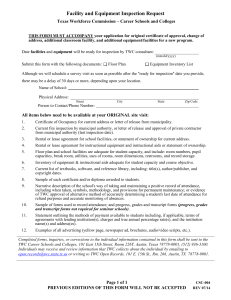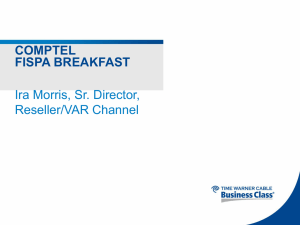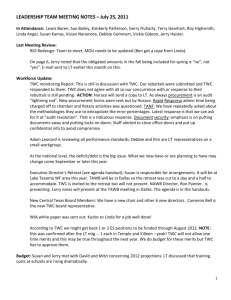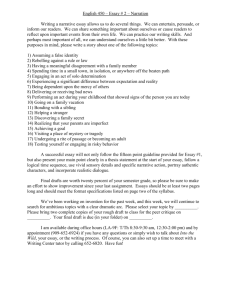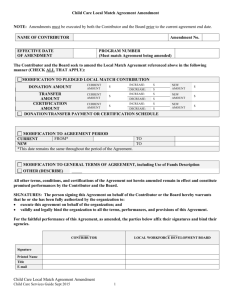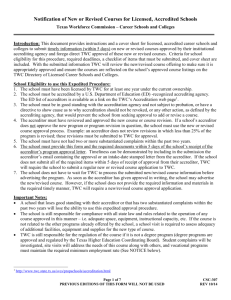here - Boston University
advertisement
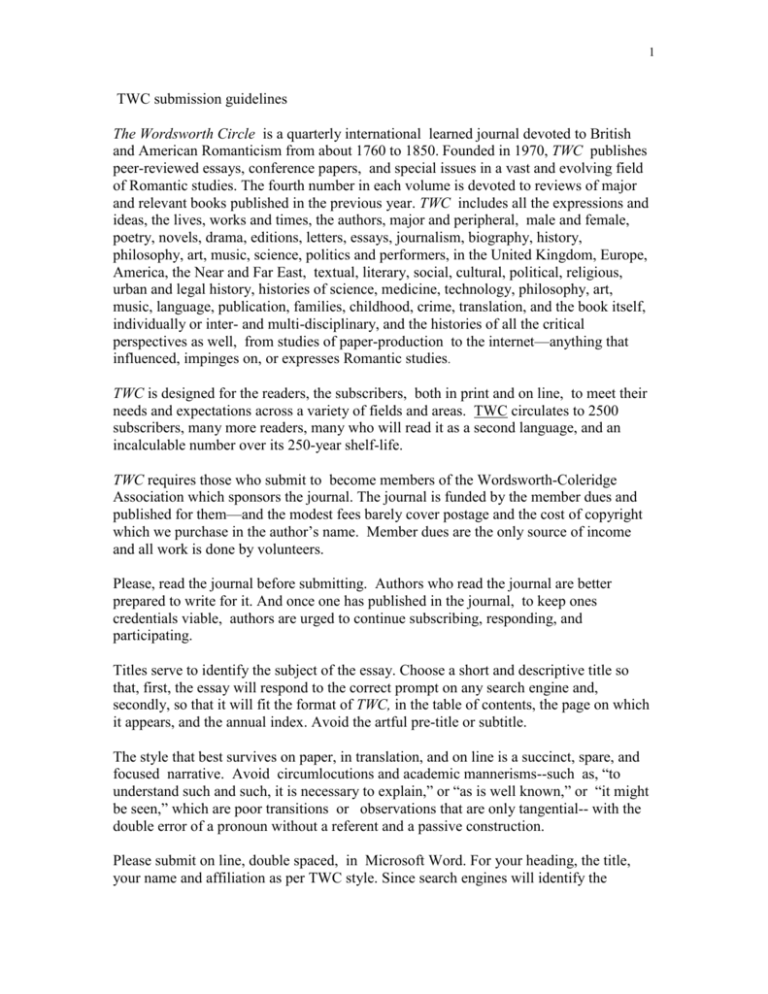
1 TWC submission guidelines The Wordsworth Circle is a quarterly international learned journal devoted to British and American Romanticism from about 1760 to 1850. Founded in 1970, TWC publishes peer-reviewed essays, conference papers, and special issues in a vast and evolving field of Romantic studies. The fourth number in each volume is devoted to reviews of major and relevant books published in the previous year. TWC includes all the expressions and ideas, the lives, works and times, the authors, major and peripheral, male and female, poetry, novels, drama, editions, letters, essays, journalism, biography, history, philosophy, art, music, science, politics and performers, in the United Kingdom, Europe, America, the Near and Far East, textual, literary, social, cultural, political, religious, urban and legal history, histories of science, medicine, technology, philosophy, art, music, language, publication, families, childhood, crime, translation, and the book itself, individually or inter- and multi-disciplinary, and the histories of all the critical perspectives as well, from studies of paper-production to the internet—anything that influenced, impinges on, or expresses Romantic studies. TWC is designed for the readers, the subscribers, both in print and on line, to meet their needs and expectations across a variety of fields and areas. TWC circulates to 2500 subscribers, many more readers, many who will read it as a second language, and an incalculable number over its 250-year shelf-life. TWC requires those who submit to become members of the Wordsworth-Coleridge Association which sponsors the journal. The journal is funded by the member dues and published for them—and the modest fees barely cover postage and the cost of copyright which we purchase in the author’s name. Member dues are the only source of income and all work is done by volunteers. Please, read the journal before submitting. Authors who read the journal are better prepared to write for it. And once one has published in the journal, to keep ones credentials viable, authors are urged to continue subscribing, responding, and participating. Titles serve to identify the subject of the essay. Choose a short and descriptive title so that, first, the essay will respond to the correct prompt on any search engine and, secondly, so that it will fit the format of TWC, in the table of contents, the page on which it appears, and the annual index. Avoid the artful pre-title or subtitle. The style that best survives on paper, in translation, and on line is a succinct, spare, and focused narrative. Avoid circumlocutions and academic mannerisms--such as, “to understand such and such, it is necessary to explain,” or “as is well known,” or “it might be seen,” which are poor transitions or observations that are only tangential-- with the double error of a pronoun without a referent and a passive construction. Please submit on line, double spaced, in Microsoft Word. For your heading, the title, your name and affiliation as per TWC style. Since search engines will identify the 2 published essay by the title and first line, compose them carefully, nouns and verbs, to identify the subject and substance of the essay. For citations, use MLA style, with refs in the text and a bibliography at the end—in paragraph form (see previous issues). Endnotes are for further comment, not citations. Place as much information in the text as possible as a courtesy to the readers and because search engines will often import your footnotes into the text and disrupt your prose. So, instead of “a recent critic,” write, “As Carl Woodring wrote in Literature: An Embattled Profession (1999)…” and place the page number in parens at the end of the sentence. Since the origin the journal is the US, TWC uses American style punctuation, double quotes where British use single, and vice versa. Also, commas, periods, and question marks are inside the quotes. Submitting in this format avoids the errors that inevitably arise when corrections are made in-house and saves the expense of copyediting. British authors may use British spelling. Foreign words should be in italics. Also, cite dates in normal order: August 14, 2000, rather than 14 August 2000. To prevent confusion with subsequent encoding, please, do not use sub-headings (they do not fit our format), or underline where italics are intended. Please, avoid all typographical attempts at emphasis (italics, bold, or underline). After the essay is accepted, revised if necessary, copy edited to suit house style, you will receive final copy for approval and for proof reading. The copy you submit at this stage is the copy that will be published. The following suggestions are not unique to TWC but drawn from standard international copyediting manuals and suited to all writing for all forms of publication. 1.Avoid the first person plural—“we.” It doesn’t work and is a poor substitute for the strategic first person “I.” Also it sounds pompous, encourages generalizations, and, because it creates an unwarranted complicity, offends readers. It is not translatable in several languages, and is reserved for the editor. Some readers consider it exclusive— meaning “we,” only us, as opposed to you and them. Authors who died in the 19th century are not “telling us” anything. 2.Similarly, avoid pronouns with no specific antecedent. The Jane Austen “it is a truth universally acknowledged” is a truth nobody acknowledges at all. For different reasons, though the same pronoun error, avoid the thoughtless transition, “It is easy to forget,” or “It is important to remember”: usually, “it” isn’t either, or if “it” is, then why mention “it”? Similarly, avoid “this” and “which” without specific and immediate antecedents. 3. Whatever your theoretical perspective, for the reader, agency is essential. Surely the worst but most common example of passive, inaccurate pronouns, is the academic cliché: “To better understand [or interpret or explain], it is necessary to…..” or “As can be seen…,” or “The Eighteenth Century witnessed…” 3 4.Avoid the artful “I suggest,” when you insist, “apparently” when you mean in fact, “in fact” when you mean and even say probably, “probably” when you mean indeed, “indeed” when you are not sure, “perhaps” when you are quite sure, “arguably” avoid always, “especially,” “particularly,” “specifically,” and/or “significantly,” or “more specifically,” “more importantly,” any “more” of anything, sometimes together, “all too visible” and, similarly, “all too often,” “all too clearly,” and “all but” anything. These modifiers. I suggest, are probably in fact no doubt essentially empty and indeed usually if not always defer or even obscure the all but invisible substance, as this sentence illustrates. Also, do not use “of course,” and “clearly”: if something is obvious and clear, it will not require them and, if it isn’t, then using these terms will not make something that is muddy or obscure more accessible. Like “more,” “increasingly” doesn’t convey anything and is increasingly over-worked. “When you catch an adjective, Kill it,” attributed to Mark Twain, is the title of Ben Yagoda’s 2008 book on parts of speech and how to use them. He writes, “That it is good to avoid [adjectives] is one of the few points on which the sages of writing agree. Thus Voltaire: ‘The adjective is the enemy of the noun.’ Thus William Zinsser: ‘Most adjectives are ... unnecessary. Like adverbs, they are sprinkled into sentences by writers who don't stop to think that the concept is already in the noun’." 5. Selection and subordination are essential. Do not include dates just because you have them if the timing of a statement, event, or publication is not relevant. Similarly, in letters, do not include recipients or the locations if they have nothing to do with the statement. Adding such specificity does not make your work more factual. 6. Integrate quotations in the text, paraphrasing where necessary. Do not paraphrase a text you have quoted. And be sure to check quotations for accuracy. Only set off quotes that are over ten lines of text. 7. Search engines have altered the way scholars write as well as research. Because they mostly quote the first sentence, or part of it, or at most the first paragraph, the best opening is simple: What are you doing? Why? How? Avoid opening with a generalization, especially those with “critics,” or “scholars,” or “readers” as the subject, followed by what they have “overlooked,” “neglected to note,” 4 or simply have never written about. Such generalizations are seldom true and they offend the only people who might be interested in reading your work. Literary criticism is not a zero-sum game: for you to be right, everyone else does not have to be wrong. Being first as a literary critic is seldom possible or even virtue: if what you are writing about is so obscure, unprecedented, or original that no one has even thought of it before, it may be that no one is interested in the subject--which means you don’t have an audience and there is no reason to publish it. 8. Avoid attributing emotions to animate an otherwise dead sentence, and author. So, “Coleridge’s reunion with Dorothy and William was ecstatic,” or “Wordsworth had had second thoughts about Lyrical Ballads,” or “Sarah was so indignant,” Wordsworth “suspicious,” or “angry” “hoping,” “disappointed,” “shattered,” “feared,” “hoped, ” “distracted,” “disliked and distrusted educated women,” “motivated by jealousy,” “fascinated” by this or that, all the simple but excessive responses, judgments, attributions, and projections you would resent if someone were to attribute them to you. Similarly, speaking of secondary sources, as an author, I object when critics write that I “argue,” “dispute,” “question,” “object to” or “disagree” when all I have done is comment, observe, or contribute to a topic. 9. Avoid jargon and use contemporary critical terms carefully: space and place are not the same; privileged and preferred are not the same; deconstruct and analyze are not the same, and so on. Hegemony, occlude, interrogate, tease, or complicate a text, construct a period, and recuperate for recover are usually inaccurate, carry misleading connotations, and, if they work now, will fail in the future, and confuse those many readers for whom English is a second language. Such terms are often translations, approximations, and work best in the context of the original critical theory which generated them. Also avoid unnecessary foreign words such as oeuvre when an English one is available. 10. Do not use possessives with inanimate objects, poem’s, volume’s, year’s, and so on. This practice emerged with some theoretical positions and hangs on, a strange kind of anthropomorphism, attributing agency to things while the authors disappear. 11. Avoid redundancies such as “but although,” “especially significant,” “more importantly,” “and also, ” “more specifically,” and so on. 12. If your essay is full of negatives and “buts,” try to replace the reservations and negations with assertions. Do not use coy phrases such as “not uninteresting,” “not without error,” “not unimportant,” when you mean interesting, wrong, and or significant. 13. Respect the integrity of the text you are discussing, whether it is a review of a contemporary book or an historical poem or novel. Be wary of sentences that begin, “Instead of,” “Rather than,” and constructions based on “not this and not that” to identify things you wish an author had written or think he or she should have written. 5 And honor the difference between texts and reality—fictional characters do not have choices to be other than what they are. Authors have choices. 14. I have yet to solve the gender problem with pronouns, and I am wary of those who think they have, or anyone who thinks he has, depending on how you solve it. I do not approve of turning “he” into “they” and thereby introducing an error in number to avoid a problem in gender. 15. Wordy or “baggy” sentences are nearly always the unfortunate result of an author’s choosing a series of approximate nouns and verbs instead of the absolute correct ones creating inflated sentences that cover all contingencies, which most people agree is not the most efficient way to write, and certainly is not, from my experience, the best way to attract and to keep a reader’s attention, nor is it, usually, within a publisher’s budget to allow this luxury of what we can only call excess if not indecision, which even your computer can identify— or, as Strunk and White said, “Avoid needless words.”(negatives, prepositional phrases, shifting points of view, inappropriate imagery, adverbs, passive constructions, all of the above—and try not to shift point of view in the middle). Example: Wordsworth: “Poetry is Pleasure.” 16. In entering the long conversation of literary scholarship and criticism, acknowledge how your work connects to the others in the conversation, what it contributes. It is a small profession, a long life, and building community (which is what TWC, indeed all publication exists to do), depends on cooperative writing, on inclusive readings, on both/and hypotheses. On a practical level, your audience usually consists of those who are in your field. They may be the ones who are asked to peer-review your essay or book, or to review your book after it is published, or to support a grant application, to be an outside reviewer for awards or promotion.. It is good sense to acknowledge their work and avoid attacking them in footnotes. At the very least, you will offend the only audience that is really interested in your work. 17. Before submitting your text, check all your quotations, page numbers, dates, the spelling of proper names places. Do not expect the editors to find your errors. Copyright: TWC has always used protective copyright, meaning we pay for and hold copyright to protect the rights of the author. Authors are entitled, therefore, to use their work any way they see fit so long as they acknowledge its appearance in TWC. Production: Your essay will go through many processes of composition, checking and adjusting. We shall be translating your work into a finished journal, one among many essays in an issue which has to come out to sixty-four pages or multiples of sixteen. It must relate to volumes that have preceded it and those that we hope will follow. Every issue is more than a collection of whatever is on hand; we produce a journal that we assume will be read, and judged, from cover to cover by our subscribers who entrust us not only with their money but also with the critical and scholarly conversation we share. 6 Your sending us your work means that you want it to appear in TWC as part of both a collection and a tradition. As editors and publishers, we have to make the miniscule adjustments that are required for your work to appear in a particular issue, in the volume, in many volumes. Such adjustments are less than editing, but more than merely reproducing what you send us. Our adjustments may mean leaving off a phrase to save a line, or finish a page, or a paragraph. We do not make any changes that would alter your meaning or tone. But because of space or the appearance of a page, we might substitute a concise way of saying what you want to say, a substitution that takes place in production when there may not be time to ask for your approval. Any small changes, you may be assured, were required by space. For example, in recent essays, we changed “and he has gone on to note that” became “noting that,” or “although I did not have enough space to examine all of ---novels and poems, I would like to suggest some of the important but neglected issues and questions…” became, for matters of space, “In conclusion…,” leaving so much wonderful work for the next essay. You will have final approval of your text. Proof-reading and errors: the human mind is a correcting machine. Most people do not see their own errors, nor do most editors or readers. Their minds automatically correct them. That is what makes proofreading so difficult, more difficult with optical scanning and spell-check. Be assured, then, that if you and two in-house proofreaders missed an error in the most attentive of readings, then so will the readers who come to your essay. Readers see what they expect, find what they are looking for, skim, scan, and overlook the details where minor errors are mostly to appear. We have all lived with terrible goofs, by the best publishers, and I know of no career that was destroyed or any author blamed for an error in proofreading. We hope you will enjoy the experience of publishing in The Wordsworth Circle and will continue to participate in our activities. Marilyn Gaull, Editor Subscription Form Please make checks (in American or British currency), payable to The Wordsworth Circle. Mail them to The Wordsworth Circle, The Editorial Institute, Boston University, 143 Bay State Road, Boston, MA 02215. British scholars may arrange a bank transfer on request—address inquiries to the managing editor, cbingham@bu.edu. For subscribers in the US: $35.00 per volume. For subscribers outside the US: $40 per volume. Fees include postage and membership in the W-C Assoc. We accept British Sterling at the current exchange rate. Name:__________________________________________________________________ Address:________________________________________________________________ ______________________________________________________________________ E-Mail Address:__________________________________________________________ 7
